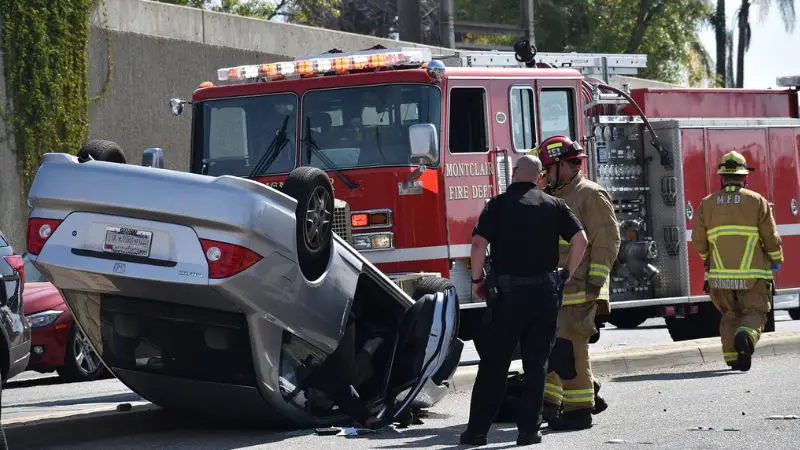Car accidents are unexpected and unsettling events that can leave us shaken and disoriented. In the midst of the chaos, it’s essential to remain composed and take specific actions that ensure safety and protect your legal rights.
Whether it’s a minor fender bender or a more serious collision, knowing what steps to take can make a significant difference in the aftermath of a car accident. In this article, we’ll walk you through eight crucial actions you should take after a car accident.

1. Check for Injuries and Safety
The immediate aftermath of a car accident can be disorienting, but your first priority should always be safety. Check yourself and your passengers for injuries. If anyone is hurt, call for medical assistance right away. If the injuries are severe, avoid moving injured individuals unless it’s absolutely necessary to prevent further harm.
Next, if the vehicles are in a dangerous location, try to move them to the side of the road if it’s safe to do so. Turn on your hazard lights to alert other drivers and consider using warning triangles if you have them. These actions can help prevent additional accidents and keep everyone involved safe.
2. Contact Emergency Services
Once you’ve ensured safety, it’s time to call emergency services. Dial 911 to request medical assistance and police presence at the scene. Even if the accident seems minor, having an official police report can be crucial for insurance claims and legal matters. When you speak to the emergency operator, provide accurate and detailed information about the location, the number of vehicles involved, and any injuries.
Police officers can help manage the situation, gather information from all parties, and document the accident scene. Be cooperative and follow their instructions. Their presence can also deter potential disputes and ensure a thorough documentation of the incident.
3. Consult Legal Professionals
In more serious accidents involving injuries or disputes, seeking legal advice is crucial. Legal matters surrounding car accidents can be complex, and consulting an attorney specializing in personal injury cases can provide you with valuable guidance. For instance, consulting a legal expert can be invaluable if you’re facing challenges in receiving fair compensation or encountering difficulties with insurance companies. According to a Beverly Hills car accident lawyer, you need an experienced and resourceful attorney to help you navigate your accident claim. With their specialized knowledge and experience, they can guide you through the legal process, ensuring your rights are protected.
An experienced attorney can also help you become familiar with the legal process. Furthermore, they negotiate settlements on your behalf and ensure that you receive fair compensation for your injuries, damages, and any emotional distress you might have experienced. While not every accident necessitates legal involvement, having access to professional advice can provide peace of mind in challenging situations.
4. Exchange Information with Other Parties
After ensuring safety and contacting emergency services, it’s time to exchange information with the other drivers involved in the accident. This is one of the basic post-crash steps you should not forget. Exchange names, contact information, insurance details, and vehicle information. This information will be vital for filing insurance claims and resolving any potential disputes.
Gather their contact information if there are witnesses to the accident. Their accounts of what happened can provide valuable support for your version of events. Additionally, take photos of the accident scene, including the position of the vehicles, any damage sustained, and relevant road conditions. These photos can serve as visual evidence when dealing with insurance companies and legal authorities.
5. Document the Accident
Accurate documentation is essential after a car accident. Take notes about the accident, including the time, date, location, weather conditions, and any other relevant factors. Write down the names and badge numbers of the responding police officers.
Providing a detailed account of the accident to your insurance company and potentially legal professionals later on will rely on these notes. Your memory might fade over time, so having a written account can ensure that you accurately recount the events.
6. Notify Your Insurance Company
Promptly notifying your insurance company about the accident is crucial. Insurance companies often have specific timeframes within which accidents must be reported. Failure to report the accident in a timely manner might result in coverage issues.
When you contact your insurance provider, provide accurate and honest information about the accident. Insurance adjusters will assess the damage to your vehicle and facilitate the claims process. Cooperating fully and honestly with your insurance company can expedite the resolution of your claim.
7. Seek Medical Attention
Even if you believe your injuries are minor, seeking medical attention is important. Some injuries might not manifest symptoms immediately and could worsen over time. A medical evaluation can identify any hidden injuries and ensure you receive proper treatment.
Documenting your medical visits is essential for insurance claims and potential legal actions. Keep records of doctor’s appointments, diagnoses, treatments, and prescriptions. This documentation not only supports your claims but also ensures you’re taking the necessary steps to recover fully.
8. Maintain Detailed Records
Finally, after the initial chaos settles, it’s crucial to maintain detailed records of all documents related to the accident. This includes medical records, police reports, insurance correspondence, and any legal documents. Attend all scheduled medical appointments and document any ongoing treatments or therapies.
Keep a record of all relevant documents, such as medical reports, repair bills, insurance correspondence, and any other related paperwork. Organize these records in a safe and accessible place. Organizing and managing your documentation effectively will support your case and facilitate a smoother resolution.
Detailed records are essential for insurance claims, potential legal actions, and future disputes. By having well-organized documentation, you’ll be better equipped to address any issues that arise down the road.

Car accidents can be unnerving and overwhelming, but taking the right actions in the aftermath can make a significant difference in ensuring your safety, protecting your legal rights, and resolving insurance claims. Remember to stay calm, prioritize safety, and follow these eight crucial steps. By doing so, you’ll be better prepared to navigate the challenges that can arise after a car accident and ensure a smoother path to recovery.

Robert Anderson is a world class motorhead who rebuilt his first carb at age 10, his first engine at age 15, and completed his first full hotrod build when he was just 18! Previously, he has ran a part warehouse, delivered pizzas, and managed the service department for a $20 million/year revenue dealership. Robert knows cars like few others and he is passionate about sharing his knowledge.
